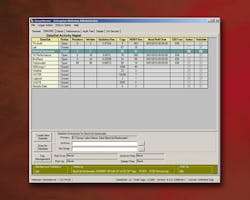Historian V9 for Small to Large Communication System Needs
Providing scalability without requiring special computing software, Canary Enterprise Historian works for applications ranging from 100 tags to over one million. Accommodating simple, small systems to complex, large systems, the historian software and tools provide an ideal solution for collecting, storing, managing and validating data from any source in the communication sector that meets the OPC DA (Data Access) specification.
Enterprise Historian is an OPC-UA (Unified Architecture), and OPC-HDA (Historical Data Access) compliant server, and users can access data via any other OPC-UA or OPC-HDA compliant programs. Canary Enterprise Historian version 9 can log more than 3.6 million updates per second, with sub-second updates, easily accommodating high-speed applications. The OPC-UA interface provides enhanced security using software certificates with data signing and encryption supporting contemporary IT standards.
The Canary Enterprise Historian Administrator tool allows users to monitor and configure any historian on a network from a single location. Administrative tools including automatic dataset validation, archiving, roll over and roll up, audit trails and performance monitoring allow Enterprise Historian to run in even the most complex enterprise environments. Plus, multiple Enterprise Historians can be used for redundancy and high data availability needs.
"With more than 10,000 implementations in 26 countries, Canary Labs’ data historian solutions have been proven effective in almost every industry—enhancing product visibility, reducing downtime and eliminating product waste," said Gary Stern, President of Canary Labs. "Canary Enterprise Historian version 9 offers more than one million tags with one second updates—managed on a single machine." Stern adds, "The Canary Logger logs data from any OPC DA interface—the most prevalent standard in the industry—allowing it to be interfaced with almost any PLC or device."
When the Canary Logger is logging to a remote Historian Service and the connection is lost for a period of time, the Logger will start caching the data. It will then automatically try to re-establish the connection back to the Enterprise Historian. When a successful connection is made, it will send the data that has been cached, protecting the integrity of the data in the occurrence of a communication failure.
Features of Canary Enterprise Historian version 9 that make it particularly effective and easy to use include:
- Client scalability: Supports large numbers of clients through multi-threaded application structure
- Tag scalability: Offers one hundred to more than one million tags to accommodate the broadest range of applications
- Organization: Allows logical grouping with flexible configuration
- Speed: Provides sub-second updates; logs more than 3.6 million updates per second
- Performance reliability: Provides built-in performance monitoring
- No data loss: Reduces the impact of storage space via intelligent engineering techniques—without lost data by compression
Canary Labs - www.canarylabs.com

